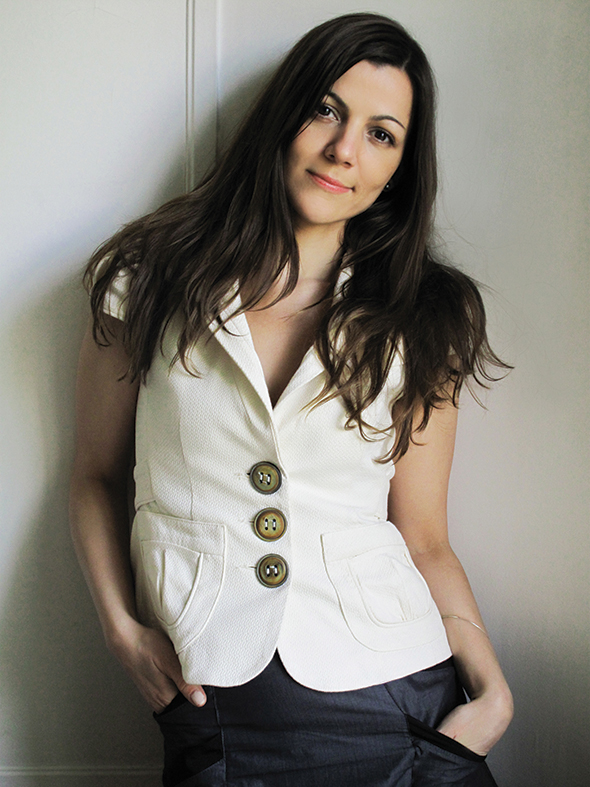Lindsey Nefesh-Clarke

Lindsey Nefesh-Clarke, 44, is an entrepreneur of worldly sorts. From her education at the University of Cambridge and later at ESCP Europe, Lindsey began a professional path underscored by her social conscience. Before founding Women’s World Wide Web (W4), a Paris-based crowdfunding platform dedicated to empowering girls and women around the globe, Lindsey worked for Human Rights Watch, UNICEF and Grameen Bank.
Did you always want to be an entrepreneur?
Not at all! I just tried to follow my passion and I gravitated from the humanitarian and development sectors to social entrepreneurship. Working with extremely poor families in urban and rural slums and cemetery-slums in Africa and Asia motivated me to found W4 (Women’s World Wide Web). Witnessing the incredible resilience, determination and entrepreneurial capacity of the people I’ve worked with, their will to survive, to feed their families and send their children to school— this is what drove me and strengthened my capacity to take risk…and entrepreneurship requires a solid tolerance of risk!
Which experiences, either personal or professional, have been the most helpful in your career?
The professional and personal collided for me when I found myself in the midst of a humanitarian crisis in Cebu, in the Philippines. A devastating fire broke out in one of the largest slums, leaving three thousand people homeless, half of them children. The families fled with just the clothes on their back. They lost everything, what little they had, including, tragically, the work tools they needed to sustain their meager livelihoods. I coordinated emergency relief operations and was grateful to be able to help, but I came back to Europe feeling the need to do more. This prompted me to pursue an Executive MBA so I could take my humanitarian work further, and it all led to W4. Beyond the professional arena, I do rock and mountain climbing and yoga, which also help me to go beyond my comfort zone in other areas of my life and work.
What exactly sparked the creation of Women’s World Wide Web?
The powerful impact of what are arguably the two most important trends of the 21st century: the spread of digital technologies and girls’ and women’s empowerment. Also, the urgent need to protect girls’ and women’s human rights. From Bangladesh to DR Congo, from the US to Pakistan, I’ve seen that educated, empowered girls and women are central in the effort to break the cycle of poverty, ensure the welfare of communities and drive socio-economic progress. International Women’s Day 2015 was aptly entitled “Empowering Women, Empowering Humanity.” At the macro level, empowering girls and women is one of the most effective means to address poverty, hunger, environmental sustainability, extremism, social stability and global security. This is The Girl Effect! And I’ve seen how digital technologies can empower communities, from mobile health services to e-learning, opening up resources and opportunities that dramatically improve lives. Technology is democratizing the power to drive change.
The projects at W4 address a wide variety of issues, from women’s fundamental wellbeing to educational opportunities. How does the W4 team decide on the projects for which they crowd fund?
Our network of projects aims to reflect the issues underlying women’s empowerment, which are varied and tough. W4’s overall marketing is highly positive and solution-oriented, spotlighting powerful, affordable solutions. At the end of this year, we’ll be incorporating rewards-based crowdfunding. We want to put the “fun” into crowdfunding. Because we’re committed to transparently reporting the impact of every single donation, whether five or fifty thousand dollars, we’re expanding our network of projects carefully and gradually. What they have in common is: they’re highly effective, efficient, and grassroots, managed by local communities.
Who are the women who inspire you the most?
There are so many high profile, trailblazing women in tech and other fields. But I’m most inspired by the heroic girls and women I’ve had the privilege to meet through my humanitarian work: Pakistani women’s rights advocates in the tribal zones in Pakistan who put their lives on the line every single day to defend girls’ and women’s right to an education; the women survivors of sexual violence in W4’s program in DR Congo, whose resilience is awe-inspiring; the women who live in the cemetery in the Philippines, where W4 runs an education program, who are determined to give their daughters the opportunities for literacy and education that they never had. There’s a vocational IT training center for young women from the cemetery, part of a wider program to combat human trafficking. Those young women may have been raised among tombstones, but their IT prowess never ceases to amaze me!
Text by Kyle Thornburg
Photograph by Magali Papale

